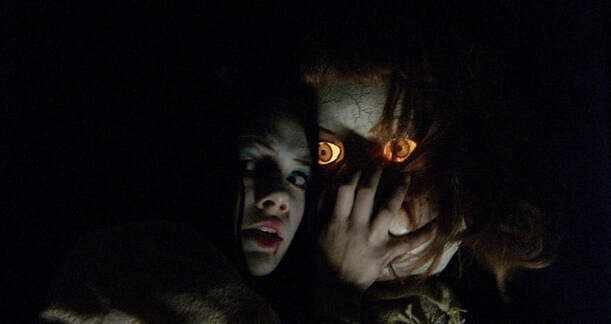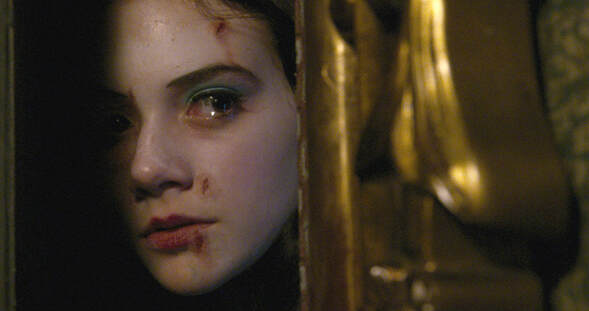 I have a list of movies I can never watch again. It’s not written down anywhere, and it’s not genre-specific. But their effects on me were burned into my brain such that to return to them produces a wave of anxiety akin to some of my deepest, most personal fears... ...For a long time The Strangers topped the list. Every single thing about it so supremely fucked me up I had to sleep with lights on and triple check the locks on doors and windows for a month after watching it. I still can’t handle hearing the song that plays on the record player, and if I were to google home-invasion movies and search images, I would have to look away from those masks as quickly as possible. Everything about it sets me on edge. I even posited watching it now, in the time of mass quarantine, would be interesting and subsequently had extremely vivid nightmares for three nights. Despite all of this, I find that I love it. Enough that, with enough time passing, I can do repeat watches. Not now, clearly. But in average circumstances, in normal life, I could watch it again. I have seen it, I think, three times altogether and loved it while it was playing, even as I knew it would wreak absolute mental havoc. The only horror movie thus far to knock The Strangers off the top was 2018’s Incident in a Ghostland. I first saw it on Shudder, and absolutely everything was the most harrowing shit I’d ever seen. So much so that, in a time of great emotional life turmoil, I wasn’t sure if it was my life circumstances or the movie that gave me the first gray hair I ever had. Either option was viable. I knew when it was over I would never hit play on it again. WARNING: SPOILERS AHEAD Written and directed by Pascal Laugier, it tells the story of a mother and her two daughters, Beth (played in her younger incarnation by Emilia Jones) and Vera (younger iteration played by Taylor Hickson), who travel to an old mansion they recently inherited from an aunt. On the way there, Beth reads a news story about a string of home invasions that end in tragedy. Mothers are killed, daughters are spared. Little do they realize, they’re being followed by the very people she’s reading about. What follows is a night of sheer terror for all parties involved, from which, honestly, it’s virtually impossible to recover. The other half of the story follows an older Beth, lifelong fan of Lovecraft and successful horror novelist in her own right, trying to cope with her past and the effects that night had on her and her family. But here’s the thing about Ghostland…it’s never quite clear, till the final act, what can be trusted. What is the truth? And how do you cope with the impossible? We get a bit of a look into how each character deals with trauma, but the focus of the movie is clearly Beth. She also happens to have the most unique and powerful survival mechanism of them all — she completely removes herself into a more stable and comfortable fantasy life than whatever she happens to be dealing with. On the inside she’s living her best life, unafraid of anything. On the outside? She’s basically catatonic. Completely unresponsive to anything going on around her. Not exactly the best way to handle a home invasion. I think we all have idealized versions of ourselves that we’re aware of. Versions of ourselves we wish or aspire to be. More confident, outgoing alter egos. When necessary, we pull out some of their courage and embrace life more fully, but on the whole reaching them full time requires a lot of work, and a lot of growth on our part. And even if some of you out there don’t have these versions of yourselves, I at least know I’m not alone in my having one. On the whole I think they’re really beneficial things to have…but Ghostland doesn’t shy away from showing us the damage that can happen when we neglect to deal with real life as it happens. Escaping temporarily in daydreams is one thing. Letting them consume you entirely is another, far more dangerous beast. Beth wants to be a fighter, confident and capable of survival no matter how harrowing the situation around her. She wants to be able to keep her family safe in some measure. But in reality she can’t. Her mind, when faced with indescribable trauma, snaps entirely. She dissociates and becomes unreachable. Even as things float out to her in her dream world, she is willing more to brush them away and stay hidden than she is to face them. It’s honestly probably a much more common response than we’d like to think, at least to a point. Our minds do try to block out trauma that seems too much for us to handle, sometimes for years at a time. Even when we survive or face the unimaginable, we move on. We keep going. If we happen to get set off by certain triggers that take us back to that big traumatic thing, well, see you in therapy. There are about 100 creepy buttons this movie pushes for me that make it one of my most terrifying watches. Unsettling dolls, near-rape, torture, death of a mother, home invasion…you name it this thing has my hot buttons built into its very fabric. Still, despite all these checked boxes, and despite the gray hair on my head afterward, I knew I wouldn’t turn it on again myself, but I didn’t know it would be unwatchable in the future. I only found that out recently. Shudder has this truly fantastic feature called Shudder TV, which is just a constant stream of shows and movies on their platform. If you can’t decide what to watch, let Shudder TV decide for you. And I — particularly right now in this time of quarantine and constant ebb of anxiety — have insomnia. I can’t seem to sleep peacefully without something playing in the background. As such, occasionally I let Shudder TV play while I’m going to sleep. It gives me something to focus on without truly focusing. Turns out, the other night around 1:00 am, the stream was playing this movie. I woke up right around its climax…and immediately had to shut it off. It was an instant panic reaction fully in the chest. I could hardly reach the button fast enough. Eventually I convinced myself the only way to be truly safe from the film’s insidious claws was to leave the app entirely, and I retreated to Disney+ and The Simpsons. But I also learned some things about myself, and about horror’s ability to leave its mark on us. The most important thing about loving horror is knowing where your boundaries are, and respecting them. It’s about knowing what sets you off in a big way and maintaining the ability to look at something and say “this is not for me” so you don’t damage yourself or your love for the genre. And sometimes, we don’t know where the limits lie until we cross them. And then we never cross them again. Boundaries are different for everyone. There are some people out there, I am sure, who can watch this movie no problem. And I’m not exactly saying Ghostland irreparably damaged me. But it did show me a very defined limit where I didn’t know there was one before. It taught me something about what I can take and what my brain will shut out. It showed me an Uncrossable Line when it comes not to my enjoyment (truly, I think this is a fantastic — if bleak — movie that everyone should watch if they can), but to my emotional wellbeing. Cheesy as it may sound, knowing your limits in all things — even something as simple as movies — is a powerful self-care tool. So go, if you like home invasion movies with creepy dolls and stalkers, enjoy Ghostland as many times as your dark little heart desires. But let my newfound lesson be a lesson to you all: enjoy this genre that swims in darkness responsibly. Don’t let anyone push you into something you don’t want to handle — not even yourself. By Katelyn Nelson Enjoy Katelyn's writing? Leave her a tip here through Ko-fi!
0 Comments
Leave a Reply. |
Archives
March 2023
|


 RSS Feed
RSS Feed